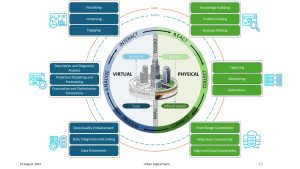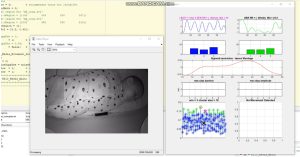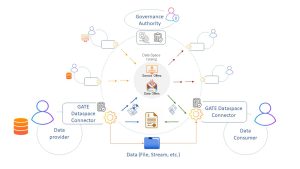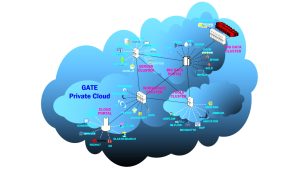Gate integrates digital twins, advanced machine learning and trustworthy data sharing infrastructure to enable sustainable urban, health and industry transformation.
The GATE Institute is the first dedicated centre for big data and artificial intelligence (AI) excellence in Bulgaria and Eastern Europe, jointly funded by the European Commission (EC) and the Bulgarian government, and was established as a joint initiative of the University of Sofia, St. Criments Orizky and Chalmers University. With a vision to enable data-driven Smart Society, Gate is driving digital transformation by leveraging the opportunities created by big data and AI technology to accelerate the impact of society as a whole. GATE will run research and create innovation in application domains such as future cities and digital health.
As the Bulgarian hub of the International Data Space Association (IDSA), Gate plays a pivotal role in creating a secure, sovereign, and reliable environment for data sharing. Gate aims to provide sophisticated infrastructure such as platforms, data, services, testing and experimental facilities, making it a recognisable national data space with trustworthy potential. By implementing federation architecture and identity-compliant components, GATE enables organizations to participate in collaborative innovation while maintaining data sovereignty and privacy. GATE also aims to be a more democratic and broad-ranging AI, building on new distributed machine learning (ML) algorithms that can address distributed assemblies of local models through federal learning and knowledge distillation, device-centric AI and ML cloud training.
By combining ontological engineering models and semantic technologies with logical policy and constraint specifications, GATE develops a new level of intelligence that can process both static and dynamic data across a variety of business domains.
In line with European regulatory and ethical leadership in AI, GATE contributes to the implementation of EU AI law and supports businesses, governments and academia in understanding and applying compliance-enabled AI. Responsible, human-centered AI expertise ensures that innovation collaborates with legal, ethical and social protection measures.
Future urban application domains
The Future Cities Application Domain explores the possibilities of digital twin technologies to address real-world urban challenges in planning, design and service delivery. The pilot project will develop a scalable urban digital twin as a technical solution for the design, exploration and experimentation of urban environments and processes. The objectives include the production of high-quality 3D urban models of Sofia, semantic enrichment of models, and applications for simulation, analysis and visualization. The Digital Twin Approach – “The First Digital of Design, Testing and Build” – demonstrates the added value of a data-driven method for decision-making, facilitating integration of digital twins into urban processes.

Sofia’s 3D models are created using cadastral data explaining buildings, green spaces, relief and road networks. This model is continuously enhanced with remote sensing data such as Orthophotos and satellite images to achieve a higher level of detail. Built on widely adopted standards such as CityGML and extended with FIWare Smart Data or custom designed models for specific use cases, 3D models are visualized using cesium virtual gloves for interactive exploration.
As part of an ongoing innovation, the Conceptual Application Domain Extension (ADE) for the CityGML 3.0 Vegetation Module has been proposed. This extension enhances tree and green space modeling through the new “hook” mechanism in CityGML 3.0 and incorporates dynamic aspects of vegetation growth and management using the Dynamics Module. New data types, code lists, and enumerations provide a unified and comprehensive explanation of vegetation characteristics and support advanced research in areas such as urban heat island effects, vegetation dynamics, and environmental impact assessments.
Several use cases illustrate the city’s digital twin potential. Urban planning and environmental analysis involves urban-scale solar radiation research to inform PV panels, passive building heating, cooling load management, and energy harvesting through microclimate assessments. These studies integrate 3D building data with remote sensing to accurately represent shading in the mountain context of Sofia. Transportation Planning develops a new digital twin-based micro-traffic simulation approach to improve city mobility and safety. Using Gate City Living Lab data, including LIDAR monitoring of vehicles and pedestrians, traffic simulations are performed using SUMO (city travel simulation). Machine learning methods such as the Random Forest Model are applied to reclassifying unrecognized objects, allowing for more accurate trajectories and object analysis. This workflow provides a scalable solution for traffic management and urban planning that can be adapted to a variety of urban environments.
The Future Cities Domain shows how digital twins and advanced modeling can support more efficient planning, safer transportation, and improved quality of life, creating actionable insights for sustainable and data-driven urban development.
Digital Health Application Domain
In the Digital Health (DH) application domain, GATE is researching and innovating along several interconnected streams. One important task focuses on biomarkers for early diagnosis, prognosis, and treatment of neurological diseases. The goal is to identify relevant biomarkers and develop robust methods for patient classification and cognitive trajectory estimation. To this end, GATE applies a range of AI/ML and segmentation methods, including convolutional neural networks (CNNS) and autoencoders, combined with local data-driven insights. The current study already demonstrates significant advances in early diagnosis of Alzheimer’s disease, and this methodology is currently being expanded to other neurodegenerative “hypersensitivity” diseases. By incorporating brain connections as the basis for mechanical understanding, the AI/ML approach is further adapted to detect and improve disease-specific parameters in multiple conditions.
Another research tide addresses real-time patient monitoring and warnings of dangerous events. Here, GATE develops a system that uses remote optical sensors to detect seizures, life support destruction, or lethal syndromes such as Sudep, SIDS, and central apnea. A real-time motor seizure detection and warning device has been developed in collaboration with the expertise centre of epilepsy and sleep disorders. While Dutch partners focus on clinical use versions, GATE is creating home devices. It integrates AI/ML into individualization, and integrates the patented GATE subsystem for optical patient tracking and PTZ camera control. Both versions are in the final stages of testing and verification.

Based on this foundation, GATE also investigates biomarker integration and real-time detection and warning in the context of telemedicine, where a combination of these features contributes to a more effective remote healthcare solution. At the same time, the methods originally developed for patient monitoring have been extended to applications beyond health. For example, real-time fall detection adapts to smart city environments, creates synergies between digital health and future urban domains, and shows how big data can create real-time social impacts.
In all of these research areas, GATE is innovating machine learning itself. The current work highlights online learning, personalization, and adaptation systems. This is an approach that is still under development early on, but could significantly increase the applicability and impact of the technology. Importantly, all algorithms, subsystems, and modules developed within the DH domain are designed in a modular way, allowing them to be reused and integrated into a variety of systems, especially in the context of strong cross-domain synergy.
Gate Data Space Lab
As the Bulgarian hub of the International Data Space Association (IDSA), Gate promotes the development of sovereign and standards-based infrastructures for reliable data sharing. A key initiative is the Gate Data Space Lab, an innovation environment for experiments, demonstrations and training. The lab is designed in line with international standards and serves as a fully operational testbed equipped with IDSA certified components, including sandboxes for implementing and verifying data sharing scenarios. Complemented with services such as technical and legal training and business model development, the lab accelerates the deployment of real data space use cases.
At the heart of this infrastructure is Eastern Europe’s first Gate Dataspace connector to achieve IDSA Assurance Level 1 certification. The connector ensures data interoperability, compliance and secure exchange, and protects complete data sovereignty. This allows organizations to define and enforce usage policies, track safety securely, and manage access accurately.
These capabilities support the development of Bulgaria’s first urban data space, supporting complex urban applications in areas such as air quality monitoring, sustainable mobility, energy efficiency, and data-driven urban planning. Utilizing federated software architecture and federated machine learning, this infrastructure allows you to extract insights from distributed datasets without transferring sensitive information outside a secure environment. Such an approach enhances traffic flow optimization, reduced exposure to pollution, or management of energy demand – forecast modeling, while enhancing trust among stakeholders who manage critical or personal data.

With its active contributions to certified connectors, demonstrator labs and European initiatives, GATE is building a resilient, interoperable ecosystem for data-driven innovation in big data and artificial intelligence.
Gate Data Platform
The GATE Data Platform supports research and innovation by providing both infrastructure for internal projects and hosting environments for external partners and clients. Built on the latest concepts of private clouds, the platform integrates a wide range of system resources, including GPUs, application servers, and advanced software tools. These resources are accessible locally in client/server mode and remotely over the Internet, providing flexibility and scalability.

The platform is fully virtualized and supports multiple levels of operation, including virtual machines, containers, application servers, and standalone services. It incorporates four different database systems that allow you to store data in formats such as SQL, JSON, RDF, and CityGML. Direct integration with the local distributed file system of Cloudera Hadoop clusters enables efficient processing of big data in both offline and real-time modes.
Designed to accommodate both software-centric and data-centric projects, the platform is consistent with modern engineering practices such as DevOps, DataOP, AIOPS, and MLOPS. From data collection and transport to platform-level processing and repository storage, to advanced analysis and interpretation, it provides a complete stack of pre-installed tools to support data management throughout the lifecycle. It is natively supported with cutting-edge AI technologies such as semantic integration, data enrichment, deep machine learning, reinforcement learning, and rapid engineering.
The platform also hosts data services for major international projects. In particular, it supports Diversea, a European initiative to study the dynamics of marine biodiversity across coastal regions from the Black Sea to the North Sea, demonstrating its ability to enable large-scale, data-intensive research with social and environmental impacts.

The project “Smart Society for Smart Society” (GATE) is the Horizon 2020 teaming program and operational program “Intelligent transformation for research, innovation and digitalization” 2021-2027R. , jointly funded by the European Union.
This article will also be featured in the 24th edition of Quarterly Publishing.
Source link

